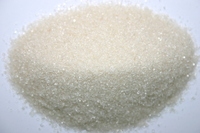 |
|
| > Welcome > Health Reporter > Sugar!
|
|
|
November 14, 2015 A white crystalline powder has collapsed world empires, caused millions of car accidents and silently triggered billions of cases of mental and physical illness. Can you guess the substance? Cocaine? Heroin? Afraid not. Sugar is the substance we are talking about, and the news is more sick than sweet. Some historians and a growing number of doctors, scientists and researchers have discovered some very sour secrets about sugar. Below are just a few of the nasty truths health professionals have uncovered about sugar: Sugar feeds cancer cells and has been connected with the development of cancer of the breast, ovaries, prostate, rectum, pancreas, biliary tract, lung, gallbladder and stomach. Sugar can suppress your immune system and impair your defenses against infectious disease. Sugar causes food allergies. Sugar causes weight gain. Sugar is an addictive substance Sugar can be intoxicating, similar to alcohol. Sugar changes healthy foods into substances the body cannot use. Sugar can make you go blind. For another hundred or so reasons how sugar can ruin the health of humans (and other mammals) look up this internet link: http://nancyappleton.com/141-reasons-sugar-ruins-your-health/1 The list goes on and on and on. After a day or two of reading all the evidence and abstracts of scientific studies, we were frightened. Here is a "food" which most people believe to be good for energy. Almost 100 years ago the sugar industry started a marketing campaign promoting sugar as a good provider of energy. Is this true? Judge for yourself. This marketing strategy started because scientists employed by the very same sugar indsutry could find NO nutritional benefit to eating sugar. Thus millions of people think sugar does no harm, it is just one of life’s natural pleasures. Sorry. There is nothing natural about white, raw or brown sugar extracted from sugar cane or sugar beet. Most experts agree sugar cane originated in Papau New Guinea and perhaps ancient China. Sugar cane looks like a lot like big bamboo! The cane is stringy and fibrous, and the juice can be extracted if you have the right kind of machine. The freshly squeezed juice is sickly sweet, a pale gold colour, laced with unusual plant flavours. From this sweet cane juice are many processing stages to reach sugar crystals. In fact, about 30 metres of sugar cane makes just a half a cup of sugar. Wow! Sugar really is a concentrated substance. "But I don’t add sugar to my tea or coffee and I don’t eat sweets," I hear you say. Believe me when I tell you this is the most common remark I have heard over more than 20 years of promoting a low-sugar lifestyle! How much sugar is too much? The recommended intake for children and adults is no more than 6 teaspoons or 30 grams (1.05 ounces) of added sugars per day. That works out to 10.9 kg of sugar per person per year or 24 pounds and 2 ounces. Surely though, people wouldn’t eat that much sugar would they? In Australia, in 2012 the average daily consumption of added sugars was not 6 teaspoons, not 12 teaspoons, not 18 teaspoons but a massive 27 teaspoons a day. Teenagers clocked in at nearly 40 teaspoons of sugar a day in 2012. 2 How much sugar would 27 teaspoons be over a year? A massive 49.3 kg of sugar per person over a year. Just close your eyes for a minute, and picture 49 bags of sugar sitting on the floor of your room! In the United States, you can see how sugar consumption increased over the massive increase in sweetened foods and drinks over 300 years: •In 1700, the average person consumed about 4 pounds or 1.8kg of sugar per year. •In 1800, the average person consumed about 18 pounds or 8.2kg of sugar per year. •In 1900, individual consumption had risen to 90 pounds or 40.8kg of sugar per year. 3 In 2009, more than 50 percent of all Americans consume one-half pound of sugar PER DAY—translating to a whopping 180 pounds or 81.6kg of sugar per year per person! The truth is, most of the sugars people eat are hidden. Thousands and thousands of processed products , many marketed as "healthy"contain sugar of one type or another. Here are a few: tinned fruits AND vegetables, baked beans, tinned spaghetti, packet soups and sauces, potato crisps, tomato sauce, jams, fruit drinks, breakfast cereals, drinking chocolate and other drink mixes, cakes, biscuits, rice crackers, frozen chicken pieces, stock powders, soy sauce, flavoured milk, yoghurt, ice cream, muesli bars, bread, dried cranberries, dried mango, dried pineapple, many low fat products... the list goes on and on. Clearly the manufacturers hare well aware that sugary foods and drinks are winners as far as profits go. But do they care about our health? Also clearly, eating and drinking sweet foods is something most people enjoy, but do they know the dangers to their bodies and minds? References: 1. Appleton PhD, Nancy, and GN Jacobs. "141 Reasons Sugar Ruins Your Health!" Educational. Nancy Appleton Books Health Bog, 2010. http://nancyappleton.com/141-reasons-sugar-ruins-your-health/.
Posted: Sat 14 Nov 2015 |
|
|
